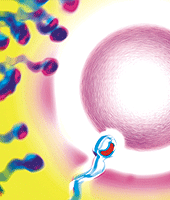Advertisement
Male Infertility
Much has been written about infertility in health magazines, and the vast majority of these articles focus on ways to improve female reproductive ability. Male infertility is seldom discussed, largely because it is erroneously thought to be rare. Unfortunately, quite the opposite is true. Infertility is defined as the absence of conception after one year … Continued

Much has been written about infertility in health magazines, and the vast majority of these articles focus on ways to improve female reproductive ability. Male infertility is seldom discussed, largely because it is erroneously thought to be rare. Unfortunately, quite the opposite is true.
Infertility is defined as the absence of conception after one year of regular intercourse without the use of any contraceptive. About 15 percent of all couples experience conception problems. Men are responsible for the problem at least 30 to 50 percent of the time.
What Causes Male Infertility?
Infertility can have medical causes such as varicocele (varicose veins of the testicles), undescended testis or testes, enlarged prostate, diabetes, thyroid disease, herpes simplex virus, congenital abnormalities, and urethral stricture. Your family doctor, urologist, or fertility specialist should first assess you for these potentially reversible causes of male infertility before you investigate alternative strategies for improving fertility.
A number of other factors may reduce sperm count, cause abnormal sperm shapes, or impair sperm motility (the ability of sperm to move spontaneously), as determined by a semen analysis. Take these steps to reverse the effects of stress, poor diet, and lifestyle habits.
Stop Smoking
Smoking over 20 cigarettes daily has been proven to reduce both sperm count and motility. Since cigarette smoking destroys many vitamins and minerals, it is important that any infertile couple do their best to quit this negative health habit. Supplemental antioxidants like vitamins C, E, and selenium can certainly help offset the adverse effects of tobacco smoke but can offer no guarantees that fertility will be enhanced if the male continues to smoke.
Stay Cool
Heat can also reduce sperm production. Hot baths, sitting for long periods of time, and tight, testes-constricting underwear can all elevate temperatures long enough to suppress sperm production. So can your work habits. A 2005 study reported in Human Reproduction found that working with laptop computers in a laptop position can increase scrotal temperature and affect male reproductive health.
Limit Drug Use
The prescription drugs cimetidine and ranitidine for the treatment of ulcers have both been reported to produce impotence as one of their side effects. Similarly, the recreational use of street drugs and excessive alcohol use may also reduce sperm count. A Japanese study, reported in 2004 in Archives of Andrology, found that alcohol use was significantly more common in infertile men (92 percent) than in the control group (80 percent). Use of anabolic androgenic steroids among recreational power athletes may also affect semen quality.
Avoid Chemicals
Further, an often overlooked cause of male infertility is excess exposure to xenoestrogens, chemicals like PCBs, DDT, dioxin, other pesticides, plastics, and industrial pollutants. These are compounds that can mimic the effects of estrogen in the body. Low sperm count, prostate cancer, testicular cancer, undescended testes, and numerous other disorders have all been linked at one time or another to exposure to xenoestrogens. Reduce your exposure to them by avoiding plastic food containers; using only unbleached coffee filters, paper, napkins, toilet tissue, and other paper products; and using only organic toiletries.
Eat Organic
A healthy diet enhances male fertility. Eat organic food whenever possible. In 1994 the Lancet reported high sperm density among members of an organic farmers’ association who grew their products without the use of pesticides or chemical fertilizers. The sperm count was more than twice as high in these men as in a control group.
Lose Weight
You’ll want to eat moderately as obesity can be associated with a low sperm count and impotence, possibly because of higher temperatures caused by excess fat near the testes. Folds of fat may raise the temperature of the testicles, lower testosterone levels, and elevate female hormone levels. On the other hand, food deprivation in men leads to a loss of sex drive and structural changes to reproductive tissue leading to infertility. Optimal weight and healthy diet should not be overlooked by the male partner of an infertile couple.
Try Nutritional Supplements
Many natural approaches have been proven to be successful or at least offer some hope in overcoming male infertility. Reports from around the world support the use of supplemental nutrients and herb extracts to enhance male fertility (see chart).
Since sperm formation takes almost three months, it will take at least this duration of supplementation before the benefits of a nutrient supplementation program are seen. Working with a natural health care provider can help optimize beneficial results and get you off infertility’s emotional rollercoaster of hope and disappointment.
PDF Table of Natural Supplements to Increase Fertility
Emotional Consequences of Infertility
The emotional consequences of infertility cannot be denied, states a 2002 World Health Organization report on gender, infertility, and advanced reproduction technologies. The report reviewed more than 60 infertility studies conducted between 1975 and 2002.
The studies reported that men who experience infertility are often more distressed than the general population. One study found that men experienced extreme worry significantly more often than women did – 19 percent of men versus three percent of women.
Another study found that men felt infertility had a negative impact on their sexual relations. In fact, infertility treatment had changed the sexual relationship of 32 percent of the men studied. Two-thirds of those who reported change stated that sex had become less pleasurable.
Yet other studies described improvement rather than deterioration of the marital relationship with infertility; subjects reported that problems related to infertility had resulted in a closer relationship with greater emotional intimacy.
Perhaps the most common coping strategy reported was the active pursuit of treatment.
Lifestyle Recommendations
Negative lifestyles may be contributing to infertility. Therefore, if patients live healthy lifestyles, it is possible that reproductive function will improve. Evidence for all these lifestyle recommendations may not be conclusive, but rarely will following these guidelines hurt, and often they may help:
- Avoid excessive heat (avoid waterbeds, saunas, hot tubs, etc.).
- Limit coffee to one or two cups per day.
- Do not smoke.
- Do not use marijuana, cocaine, or other recreational drugs. Marijuana stays in the testes for over two weeks; so even using it once every two weeks will have a negative effect.
- Exercise regularly and moderately.
- Drink no more than two ounces of alcohol twice per week. Alcohol is a male reproductive tract toxin, which associates with a decrease in the percentages of normal sperm.
- Maintain good nutritional habits, especially a diet rich in fresh fruits and leafy vegetables (organically grown).
- Be aware of sexual problems and do not hesitate to ask for medical help.
- Educate yourself about health and reproduction.
- Seek emotional and/or psychological support; consider meditation to reduce stress.
Source: Cornell University Department of Urology cornellurology.com.
Infertility and Global Warming
According to the United Nations, global fertility has declined in the past century as reflected by a decline in birth rates. At the same time the earth’s surface air temperature has increased considerably and is referred to as global warming. Could temperature change affect fertility? Research conducted at the Columbia University College of Physicians and Surgeons in New York suggests it does. Scientists compared yearly birth rates to global air temperatures from 1900 to 1994 and found a common pattern of change in birth rates. The report, published in 2003 in the journal Medical Hypothesis, concluded that long-term global temperature change has affected human fertility worldwide.




